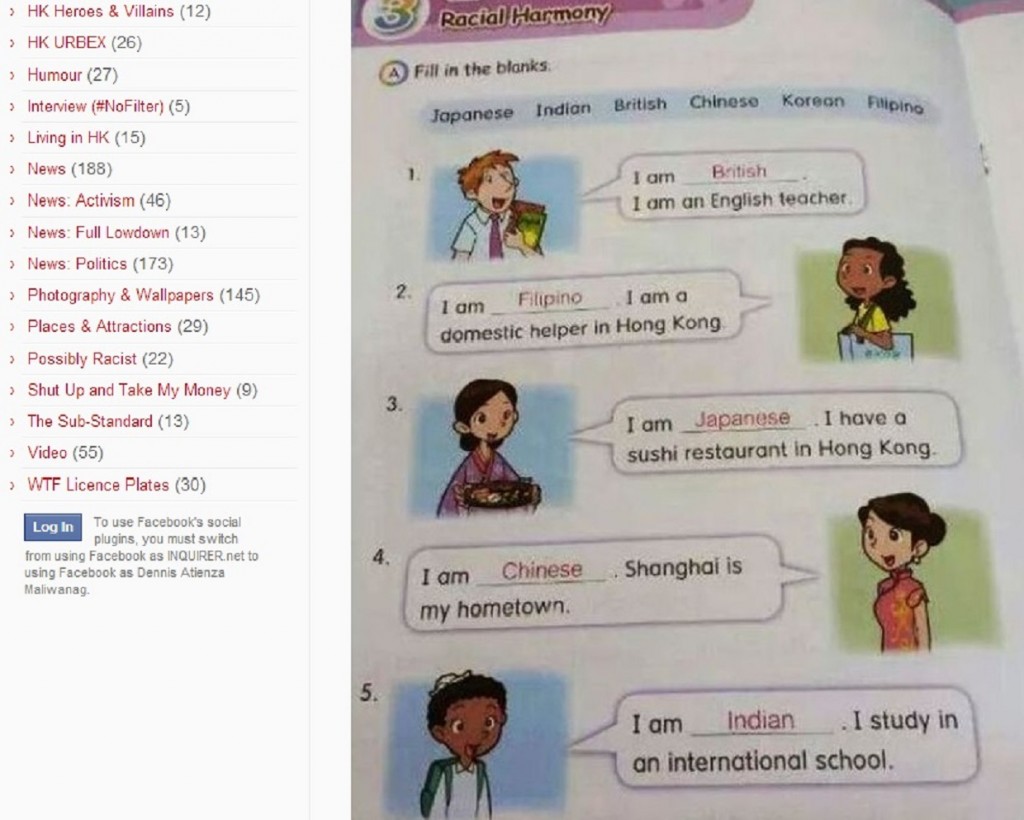MANILA, Philippines –A textbook in Hong Kong purportedly depicted Filipinos as domestic helpers, an activist blogger said, possibly changing the educational landscape of the city-state which does not stereotype ethnicity more than a decade ago.
Tom Grundy, who calls himself a British activist based in Hong Kong, posted the photo on his website Hongwrong.com in an entry entitled “Hong Kong Textbook Tells You to ‘Know Your Place!’”
The picture showed an illustrated textbook page containing a sketch of a dark-skinned Filipina saying: “I am a Filipino. I am a domestic helper in Hong Kong.”
Other illustrations include that of a British man as saying “I am an English teacher;” a Japanese woman saying “I have a sushi restaurant in Hong Kong”; a Chinese woman saying “Shanghai is my hometown”; and an Indian boy saying “I study in an international school.”
The page which contained the sketches was a “Fill in the blanks” activity under the section “Racial harmony.”
“In case you were wondering about your destiny in Hong Kong, a primary school textbook is here to enlighten you with this fun ‘fill-in-the-blank’ task entitled ‘racial harmony’!” blogger Grundy said.
Grundy said the page was from a textbook entitled “New General Studies P3” and the sketches were included in the chapter “Living in Hong Kong.” The book was published by Educational Publishing House Ltd., he added.
The activist said the photograph has gone viral in parenting, Filipino and teacher fora online.
INQUIRER.net could not immediately determine the authenticity of the illustrated textbook.
The blog posted an update giving the side of Hong Kong’s Equal Opportunities Commission, which said textbooks are supposed to “reflect diversity, cultural values, customs, lifestyles and the social realities of Hong Kong.”
“It should not reinforce stereotypes of any kind. We believe that ethnic stereotypes must be viewed with caution,” the commission was quoted as saying.
“Education should play a significant role in removing stereotypical perceptions, and schools, teachers and textbooks are catalysts to change,” it added.
1999 study on Hong Kong textbooks
Apparently, this was not the case back in 1999, when the commission facilitated a content analysis of 289 textbooks and examination papers for possible stereotypes in educational materials.
According to the study, posted on the commission’s website, educational materials do not widely represent “different lifestyles, customs, and activities of different ethnic and cultural groups.”
“Although more and more people are aware that different lifestyles, customs, and activities of different ethnic and cultural groups should be included in textbooks, this awareness has not been translated widely into representation in educational materials,” the study read.
The study even cited Filipinos working in Hong Kong, saying Filipinos were not mentioned despite the number of OFWs in Hong Kong.
“Only a few nationalities are included: Chinese, British, French, and American. Filipinos and Filipinas are not mentioned in the selected texts at all, despite their numbers in Hong Kong,” the study read.
There are about 180,000 Filipinos in Hong Kong, mostly working as domestic helpers.
The relationship between Hong Kong and the Philippines had soured after Manila refused to apologize for the act of a disgruntled police officer who hijacked a tourist bus containing Hong Kong tourists in Manila more than three years ago.
At least eight people from Hong Kong were killed and seven wounded in a bungled rescue effort by police officials.
With three years of no apology, Hong Kong cancelled visa-free arrangements for Philippine officials and diplomatic passport holders.
But in April, the Hong Kong government finally accepted the apology of the Philippines after Manila Mayor Joseph Estrada travelled there to apologize to the relatives of the victims.
RELATED STORIES
Hong Kong sanctions PH over failure to apologize in hostage drama
Palace in talks with Hong Kong over visa cancellation
Palace shrugs off Singaporean’s demand for separate bus for Filipino maids


